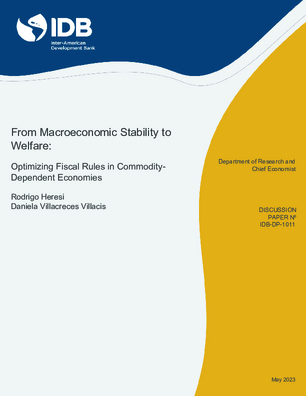From Macroeconomic Stability to Welfare: Optimizing Fiscal Rules in Commodity-Dependent Economies: Discussion Paper
Date
May 2023
This paper examines the welfare implications of alternative rule-based fiscal policies in an economy with financially-constrained households. Using a New Keynesian DSGE model of a multi-sectoral small and open commodity-exporting economy, we find that adopting a welfare-maximizing fiscal policy involves an actively countercyclical response to the tax revenue gap and a procyclical response to international commodity prices. Transitioning from a procyclical stance to the optimized rule regarding the tax revenue gap leads to welfare gains of approximately 1.5% and 0.1% of permanent consumption for Non-Ricardian and Ricardian consumers, respectively. Moreover, moving from a countercyclical stance to the optimized rule concerning the commodity revenue gap results in 1% and 0.02% larger welfare gains for Non-Ricardian and Ricardian consumers, respectively. In terms of implementation, social transfers are the best instrument to implement the fiscal rule, yielding higher welfare gains, lower macroeconomic volatility, and only moderate fluctuations in government spending.




